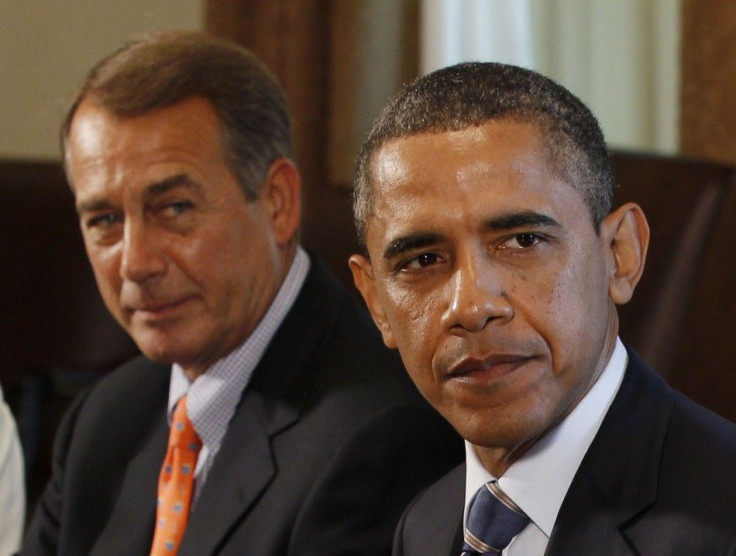Obama Speech: Pelosi Peeved, Pressure Mounting on Jobs Plan
ANALYSIS

President Barack Obama's anticipated jobs speech is still more than a day away, but already it's causing a controversial rift among Republican and Democratic leaders. Republicans have decided not to give a rebuttal to the Obama's speech Thursday before Congress, and House Democratic Leader Nancy Pelosi says the lack of response will be disrespectful to the President and to the American people.
But the bickering before the Obama speech is expected to be the least of confrontation surrounding the major, prime time moment that will precede kickoff of the NFL season on NBC as the Green Bay Packers and New Orleans Saints square off. First, it will be Obama trying to win over the America that's slipping away from his grasp amid low approval ratings with high unemployment and a slow-growth U.S. economy.
Obama's jobs speech comes on the heels of a dismal August jobs report last week that showed a net zero jobs were created in the U.S. last month, fueling concerns that the nation is heading for another recession, pressure mounts on President Barack Obama ahead of his major jobs speech before Congress on Sept. 8.
Obama is likely to try to establish the political stakes for solving America's unemployment problem, and he's likely to politically live or die by the results. But he's got little option, since economists had been expecting to show a net of 75,000 jobs created in August.
Even that predicted increase was a low number, considering the U.S. is two years out of a recession. But the poor August report, the first time since World War II that the economy had a net zero jobs created for a month, ramps up the stakes even higher than originally anticipated.
Obama's forthcoming jobs strategy, expected to come with a controversial price tag, will determine whether Obama and Democrats or Boehner and Republicans can emerge from gridlock in a presidential election year with the stronger hand. Or, the move will potentially thrust Washington back into a grisly debt-ceiling-talks-like atmosphere,without a looming deadline to force an eventual result.
But with America's unemployment problem continuing -- above nine percent some two years after the official end to the Great Recession -- and with his popularity ratings slipping during the launch of a re-election campaign, Obama apparently understands he doesn't have any choice.
Obama has said he will lay out a series of steps that Congress could act upon quickly to strengthen small businesses and put more money in the paychecks of the middle-class and working Americans, while also reducing the deficit.
A White House spokesman said Obama's speech before Congress will focus primarily on jobs, however, with detailed proposals on budget deficit reduction following at a later time. Reports suggest proposals from Obama are likely to include infrastructure spending, measures to help homeowners, and tax breaks to encourage hiring new workers.
Already, the U.S. Chamber of Commerce has objected to one measure, perhaps a signal of where some Republican leaders will dig in and attack later. The business lobbying group said it was skeptical about one potential Obama solution -- a payroll tax holiday to subsidize companies that hire workers.
Companies don't invest and hire people just because they have more cash, Martin Regalia, the group's chief economist, told Reuters. They hire people when they can put those people to work producing a product or a service that they can sell at a profit. That's what they do. And right now the economy isn't presenting that opportunity.
The biggest battle will come over spending, however, with America's deficit after the debt ceiling limit increase now above $14.5 trillion. Republicans have steadfastly rejected Obama's economic proposals over the summer, and his attempt to throw down the gauntlet, if you will, before the nation and Congress with initiatives that most certainly comes with a price tag is a risky move.
Either a nasty debate with no solution will emerge, or either Republicans or the White House will finally emerge with the stronger hand in a presidential election year.
Understanding the damage the contentious debt ceiling negotiations did to the country, lowering consumer confidence numbers and a U.S. debt rating downgrade from S&P, White House spokesman Jay Carney said the White House learned a few lessons from the harmful political posturing and gamesmanship that happened then -- and it doesn't want a repeat.
Carney said the White House wants to aviod that type of result: We can't have that. We can't afford that.
But Obama's speech on Thurday is almost certain to spark another major, contentious Washington debate -- with a defining moment result sure to follow. It just won't come right after the speech in the form of a Republican rebuttal. Instead, the Republicans -- perhaps slyly -- want to guage public reaction before taking a stand.
In other words, they will see if Obama rises to the moment with a strong, new plan or falls flat with too costly a plan, in the public's eye.
Republicans are, and have been, entirely focused on job creation. Every member of Congress, and -- more importantly -- the American people, will provide a reaction to the president's address, said Mike Steel, spokesman for Republican House Speaker John Boehner.
So stay tuned for Thursday night. The NFL may kick off America's professional football season, but the biggest conflict likely begins with Obama's prime time speech.
© Copyright IBTimes 2025. All rights reserved.





















